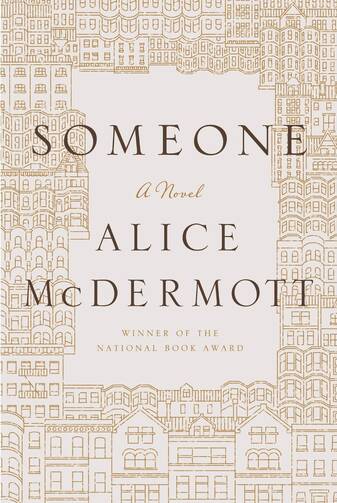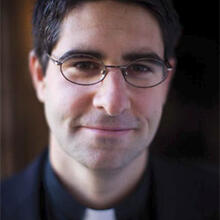The word “someone” is indefinite and ordinary. It is a word that stands in for or anticipates another more vivid concept. It almost always denotes a person: “Someone will pick me up.” “Someone will know how to get there.” It is a subtle word that carries a great deal of meaning. Someone is the title of Alice McDermott’s new novel that tells the life of someone whose life is indefinite, ordinary, uncertain, but elegant and rich with meaning. It is the story of woman’s life—someone named Marie. The narrative is structured in much the same way the most intricate lace holds together. There are lines of development and recollection that double back and fill out filigreed lace designs. Yet, the majority of the story is empty, emphasizing the beauty of the story that is given—how fragile and subtle someone’s life is. How indefinite and ordinary and beautiful anyone’s life can be, if there is someone, anyone with whom one can share it.
The Catholic Book Club’s selection for November is a novel that is much more explicitly Catholic than the novels and stories it has selected in a long time. McDermott’s novel is situated in Brooklyn in the ‘30’s and 40’s. McDermott offers her readers a world that is quite familiar, even if it has long since disappeared. It is the story of a daughter, a mother, a wife, a myopic young woman who loves her family dearly. Her family is good. They are witty and honest and fiercely loving. Marie’s story is essentially about the fierce need inside us all to have someone —not to possess or manipulate, but someone to whom one can give love.
Toward the end of the novel, Marie recalls her thoughts at a moment after the birth of her first child. She nearly died after giving birth, and, in her brush with death, her family erupts with love, anger and sadness at the thought of losing her. Marie survives. After several weeks of convalescence, she returns to her husband and decides to take a risk. Her thoughts arise in her this way:
It was not that my life was less valuable to me now that I had glimpsed what it would be like to lose it. My love for the child asleep in the crib, the child’s need for me, for my vigilance, had made my life valuable in a way that even the most abundantly offered love, my parent’s, my brother’s, even Tom’s, had failed to do. Love was required of me now—to be given, not merely to be sought and returned. My presence on earth was never more urgently needed. And yet even the certainty of that fact seemed reason to throw away caution, not to heed it (192).
As ordinary as it is, loving someone is complicated business. One learns much about love from McDermott’s story as well as the consequence of loneliness. Nearly half way through the novel, Marie’s first love dumps her cruelly. As he departs from her coldly, she asks aloud, “Who’s going to love me?” The boy she loved responds, “Someone…Someone will.”
Quite simply, the novel is beautiful. It is Catholic and humane and open to transcendence. It recognizes sin and failure and distinguishes the two. It portrays ordinary human suffering and pain thoughtfully. It has wit and surprise. But, most of all, you will recognize in it those you love or those you have loved and your memory will double back to the times in your life when you have been with them—when you simply enjoyed their presence.
The first several pages will charm you. Marie, at seven years old, encounters her neighbor as see awaits her father’s return from work. The neighbor is an awkward girl with a tendency to fall and forget. She is half Irish and Syrian, homely but confident in the love of her own family. The neighbor recounts her falling in the subway on her way home. She tells Marie of the handsome man who helped her up off floor. She concludes the tale saying, “There’s always someone nice.”
Please, take a look at Alice McDermott’s novel. When you do, please consider the following questions. I think this story will spark some rich discussion. Please, contribute in any way you wish by considering these questions or offering questions or comments of your own.
1. Is the world of Someone familiar to you? Did it provoke rich recognition in you?
2. What do you think of Marie? What didn’t she tell us? Is she really as willful and bold as she describes herself to be?
3. Does Marie have faith or hope? Others in her life certainly do. Does she?








